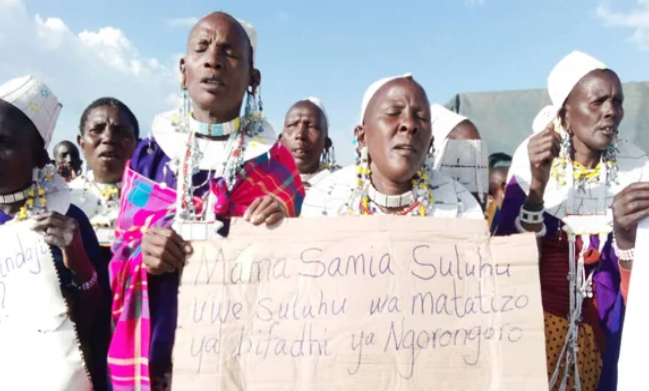Photos: Oakland Institute\Twitter
Oakland, CA — In a communication sent to the Tanzanian government, eight UN Special Rapporteurs have expressed concern on “plans for resettlement, forced evictions, home demolitions and additional restrictions which by 2027 are due to effect some 82,000 people, the vast majority being indigenous Maasai pastoralists whose traditional lands lie in the Ngorongoro Conservation Area.”

Letters on the same were also sent to the UNESCO World Heritage Committee, the International Union for the Conservation of Nature (IUCN) and International Council on Monuments and Sites (ICOMOS).
Issued by the UN Special Rapporteurs on adequate housing, cultural rights, environment, food, Indigenous peoples, internally displaced persons, poverty, and water and sanitation, the communications (AL TZA 3/2021 / AL OTH 262/2021/ AL OTH 263/2021/ AL OTH 264/2021) echo concerns raised by the Oakland Institute over the past year.
The Special Rapporteurs are “deeply alarmed at the fact that, although the NCA is home to the indigenous Maasai and their active participation in all decision-making processes concerning the site is requested by the World Heritage Committee, they have reportedly not been involved in the elaboration of strategies for the sustainable management of the area including at the conservation level.” They also raise concern that the Maasai communities’ “free, prior and informed consent was not sought in connection with the plans… which may have devastating consequences for their survival.”
“We are encouraged by the timely action of the UN Rapporteurs on allegations of human rights abuses that are within their mandates. We hope that the Tanzanian government and its international partners will pay heed and halt their deadly eviction plans,” said Anuradha Mittal, Oakland Institute’s Executive Director.
The UN Special Rapporteurs raise a range of questions — including around the consultation process with the Maasai in formulation of the multiple land use model (MLUM), measures to protect them from forced evictions and arbitrary displacement processes, the legal basis for previously issued demolition notices, measures to ensure a rights based approach to conservation in the NCA, and measures taken to demarcate and allocate collective land rights to the Maasai, among other issues. Furthermore, they urge that “all necessary interim measures be taken to halt the alleged violations and prevent their re-occurrence.”
In recent years, the Tanzanian government has received six similar communications from the special procedures mandate-holders over forced evictions, attacks, intimidation, and harassment of the Maasai. The government has failed to respond to all but one of the communications.

The Rapporteurs call on the UNESCO World Heritage Committee “to consider carefully the implications of promoting or supporting plans where several concerns have been raised that its implementation may violate the rights of indigenous peoples in the [NCA].” They urge the UNESCO WHC to use its relationship with the government of Tanzania to ensure plans for the NCA “comply with all relevant human rights standards and norms.” UNESCO has not formally responded to the communication, but claimed in a press release that it “has never at any time asked for the displacement of the Maasai people.” The Oakland Institute has challenged the blatant inaccuracy of UNESCO’s claim.
IUCN has stated that it “considers forced eviction of Indigenous Peoples and Local Communities to be entirely unacceptable.” Deflecting blame on the government, it claimed it is only an “advisory body to the World Heritage Committee… the primary responsibilities for the management of the NCA are those of the Government of Tanzania.”
This communication has to be a wakeup call for the Tanzanian government and international conservation bodies. Their plans for the Maasai to be evicted swiftly and quietly have been shattered. The international spotlight is now on the struggle of the Maasai communities to protect their lands and livelihoods in the NCA,” added Mittal.
The Oakland Institute first sounded the alarm on the plans for mass evictions and livelihood restrictions targeted at the Maasai in the NCA in July 2021. The Looming Threat of Eviction: The Continued Displacement of the Maasai Under the Guise of Conservation in Ngorongoro Conservation Area dismantled the myths, including that of “rising population” used to justify the removal of the Maasai from the land they have sustainably stewarded for generations.
“The evictions and restrictions constraining tens of thousands of livelihoods are not about ensuring conservation but about expanding tourism revenues within the World Heritage Site,” said Mittal. As one Maasai elder somberly reflected: “If this plan is to prevail, it will mark the end of the Maasai community in the famous World Heritage site.”
Since last summer, Maasai communities have waged a continued struggle to defend their land, organizing community meetings and protests, sending letters to the Tanzanian government and its main donors and circulating petitions that have been signed by millions around the world.



















